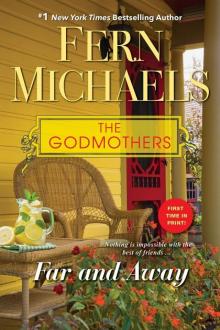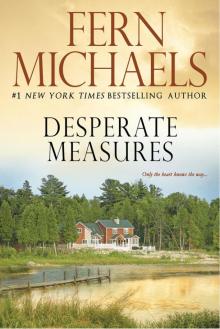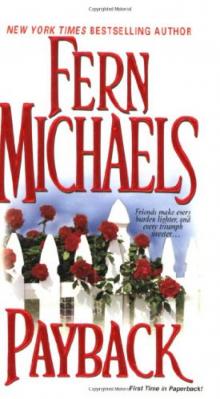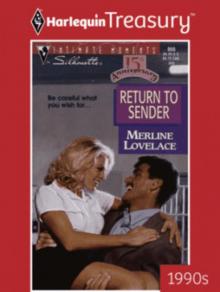- Home
- Fern Michaels
Serendipity
Serendipity Read online
“I think you should leave, Ross, and take that with you,” Jory said, pointing a trembling hand at the envelope on the coffee table.
Ross shook his head. “It belongs to you. I’m sorry you won’t have dinner with me. I think if we set our differences aside, we could have a pleasant evening. Who knows, we might even come to like each other.”
“You’re five years too late, Ross.” Was that admiration or approval she was seeing in his eyes? She felt like crying. There had been a time when she would have kissed his feet to see such a look. She would have prostituted herself for a smile or a friendly pat on the head.
Too much, too little, too late. . . .
Books by Fern Michaels:
A Family Affair
Forget Me Not
The Blossom Sisters
Balancing Act
Tuesday’s Child
Betrayal
Southern Comfort
To Taste the Wine
Sins of the Flesh
Sins of Omission
Return to Sender
Mr. and Miss Anonymous
Up Close and Personal
Fool Me Once
Picture Perfect
About Face
The Future Scrolls
Kentucky Sunrise
Kentucky Heat
Kentucky Rich
Plain Jane
Charming Lily
What You Wish For
The Guest List
Listen to Your Heart
Celebration
Yesterday
Finders Keepers
Annie’s Rainbow
Sara’s Song
Vegas Sunrise
Vegas Heat
Vegas Rich
Whitefire
Wish List
Dear Emily
Christmas at Timberwoods
The Sisterhood Novels:
Blindsided
Gotcha!
Home Free
Déjà Vu
Cross Roads
Game Over
Deadly Deals
Vanishing Act
Razor Sharp
Under the Radar
Final Justice
Collateral Damage
Fast Track
Hokus Pokus
Hide and Seek
Free Fall
Lethal Justice
Sweet Revenge
The Jury
Vendetta
Payback
Weekend Warriors
The Godmothers Series:
Classfied
Breaking News
Deadline
Late Edition
Exclusive
The Scoop
E-Book Exclusives:
Captive Secrets
Captive Splendors
Captive Embraces
Captive Passions
Cinders to Satin
For All Their Lives
Fancy Dancer
Texas Heat
Texas Rich
Texas Fury
Texas Sunrise
Anthologies:
Secret Santa
A Winter Wonderland
I’ll Be Home for Christmas
Making Spirits Bright
Holiday Magic
Snow angels
Silver Bells
Comfort and Joy
Sugar and Spice
Let it Snow
A Gift of Joy
Five Golden Rings
Deck the Halls
Jingle All the Way
FERN MICHAELS
SERENDIPITY
eKensington
KENSINGTON PUBLISHING CORP.
www.kensingtonbooks.com
All copyrighted material within is Attributor Protected.
Table of Contents
Books by Fern Michaels:
Title Page
CHAPTER ONE
CHAPTER TWO
CHAPTER THREE
CHAPTER FOUR
CHAPTER FIVE
CHAPTER SIX
CHAPTER SEVEN
CHAPTER EIGHT
CHAPTER NINE
CHAPTER TEN
CHAPTER ELEVEN
CHAPTER TWELVE
CHAPTER THIRTEEN
CHAPTER FOURTEEN
CHAPTER FIFTEEN
CHAPTER SIXTEEN
CHAPTER SEVENTEEN
CHAPTER EIGHTEEN
CHAPTER NINETEEN
CHAPTER TWENTY
EPILOGUE
FOR ALL THEIR LIVES
Copyright Page
CHAPTER ONE
Jory Ryan—that’s how she thought of herself now—finally gave in to the tremors she’d been holding in check during the past hour, but still fought her tears back. The front she’d managed to put up for Ross when he’d asked for a divorce was the hardest thing she’d ever done, harder than going through the miscarriage, harder than going off alone, harder than living alone, working and going to night school. Harder than getting through her estranged father’s funeral. But she’d done it, she thought. She’d not only persevered, but had prevailed, even when he’d tried to ease his own conscience by buying her off.
A day didn’t go by that she didn’t think of Ross Landers and the mistakes she’d made back in the beginning. Would she really have cried rape? Back then, she’d threatened Ross with it, but to this day she couldn’t say yes or no with certainty. Back then she’d been a wild, incorrigible teenager, without a mother, whose father was away from home so much, she’d had all the latitude and freedom she wanted.
How badly she’d needed a mother; but her mother died giving birth to a baby brother, who also died—one year later, when she was seven. Since then, it seemed, she’d gotten into one scrape after another.
As a teenager she’d been a tease and a flirt. But she’d only gone all the way with one other boy, and only once, before she’d done it with Ross Landers, a dozen times. She would never forget the look on Ross’s face when she told him she was pregnant. He’d said something so hateful, so vitriolic, she’d run from him, wanting to hide her shame. Afterward, Woo, Ross’s best friend, had tried to console her, saying she should be patient, that Ross would do the right thing.
For three months she waited for Ross to do the right thing. She’d called Woo again, but he’d gone back to Lancaster; so instead she showed up on Ross’s doorstep and told him she intended to have the baby, and if anyone asked why she wasn’t married, she’d say he’d raped her. She’d gone back to her father’s house then, and sat on the swing on the front porch, freezing. Ross arrived an hour later and, without emotion, told her to get in the car. They drove to Maryland and were married by a justice of the peace at eleven o’clock at night.
The following months, when she and Ross lived in a small house, were the most miserable of Jory’s life. One night in particular stood out. She’d been three months pregnant, and feeling sick and out of sorts all day. She hadn’t gone down to dinner, and at ten o’clock, when she was almost asleep, Ross came to her room and tried to make love to her. She’d done her best to help him, but he was incapable of sustaining an erection. He’d stared down at her, said she repulsed him, that she was nothing but a slut he’d had the misfortune to marry. He stormed from the room, and returned only after she’d miscarried.
Sick with humiliation, Jory packed her bags in the sixth month of her marriage and left. She hadn’t said good-bye to Ross, and saw him only three times afterward. The last time was at her father’s funeral, eighteen months ago. He’d been among the city employees who turned out to pay their final respects. He hadn’t tried to speak to her then, nor had she tried to speak to him. Jory couldn’t help but wonder what people thought about her and Ross. Did they think they were divorced, separated, strangers? She came to the conclusion they simply di
dn’t care. She didn’t care either.
“Driver, I changed my mind,” Jory said now. “Turn around. I want to go to Chestnut Hill. Gravers Lane, number sixteen.” Going back to the house she’d grown up in couldn’t be any more traumatic than what she’d just gone through with Ross.
Forty minutes later Jory paid the driver and got out of the taxi. The house was a Tudor, the yard overgrown, the trim on the windows in need of paint. She’d painted the front door a bright red as an act of defiance when she was sixteen, but she couldn’t remember why now. She did recall her father telling her to strip off the paint and varnish the door. She told him to do it himself, and took his slap high on her cheekbone. She still carried the scar his college ring made with the fierce blow. Her hand moved to her cheek to touch the thin line her skillfully applied makeup covered.
Maybe it wasn’t an act of defiance after all. Maybe she’d painted the door to bring some color into her life. At Christmastime the red door always seemed particularly festive. Now it was simply a red door with peeling paint. She felt like crying as she fit her old house key into the lock.
It was cool inside, the blinds drawn, the furniture covered with dusty white sheets. The rugs were rolled up against the wall, the floors gritty and dusty.
Tears rolled down Jory’s cheeks as she walked from room to room, peeking under the dust covers. If there had just been one person in the whole world to love her, to care about her, she wouldn’t be here right now.
She should sell the house, she thought, take the money and invest it in something that would give her a small income. The ten thousand dollars she’d received from her father’s insurance was still sitting in the Mellon Bank, along with the three thousand he had always kept in his checking account. The same perverse streak that wouldn’t allow her to spend Ross’s money wouldn’t allow her to spend her father’s money either. She knew her father’s car was in the garage. When she sold the house, she’d sell the car too.
She could live here if she wanted to, Jory thought. The two hundred dollars rent she was paying in Florida could go toward the taxes on this house. She could ask her boss to help her get a job at the Philadelphia Democrat. If she wanted to, that is. She could do a lot of things if she wanted to. But did she want to risk running into Ross and his family? She might have guts, but did she have enough to put herself through more heartache?
Jory was in her old room now, staring at the four-poster with the draped sheets. She thought of harems, jewels, and silk veils. This room should have been a sanctuary, but it wasn’t. She’d really only slept and changed her clothes here. She couldn’t remember what she did in this room when she was little. Did she play with blocks, have a rocking horse, dolls? She couldn’t remember. She lifted the dust sheet on the bed. The mattress was pale blue and quilted, the tag at the bottom wilted and wrinkled. She smiled at the slight dip in the middle. She still slept in the middle of the bed. She let the sheet fall back. It was just a bed she used to sleep in.
Tears burned Jory’s eyes when she opened dresser drawers, looked in the two closets. There should be treasures here, things she left behind. But there had been no treasures—except one. Damn, where was it? She yanked and pulled at the drawers, distinctly remembered thumb-tacking it to the back of one of them. God, let it be here, she prayed. Please, let it be here. And it was, a length of satin tied in knots, the binding from her childhood blanket. She literally swooned with feeling when she brought it up to her cheek. The one and only thing in the world that had ever given her comfort. So many times it had been drenched with tears. She couldn’t count the times she woke up in the morning with the treasure pressed into her cheek. Now, her fingers worked the knots the way a nun would her rosary. How good it felt, how wonderfully comforting. She remembered each knot, big and small. She thought of each knot as a milestone in her life. Her eyes dry, her mouth grim, Jory added a last knot to the end of the satin.
“For my pending divorce,” she said sadly.
Jory removed the dust cover from an oak rocking chair with a faded orange cushion and sat down.
If she did come back, she thought, and lived here in Chestnut Hill, she might be able to avoid Ross. Financially the move made sense. She would have a car, once she replaced the tires and got it tuned up. She could make the house into the home she never really had. She could probably take off from now till the end of the year and get the place cleaned up. She could take a sewing class and make new covers for the furniture; there was a night class for everything. There was an old treadle sewing machine somewhere in the house. She could make bright cushions, valances instead of drapes—those poofy kind she’d seen in magazines, which allowed for a lot of sunlight. She could shampoo the carpets herself, wax the floors, clean the windows. And if she decided to leave Florida, she would get severance pay, and maybe she could even collect unemployment insurance. She had eight hundred dollars in a savings account, and would get back her rental deposit and the deposits on her utilities. A thousand dollars might see her through the worst of things. And if she absolutely had to, she could dip into her father’s insurance money.
Outside in the afternoon sunshine, Jory looked around. “I’m coming back,” she said aloud, saluting the bright red door before she started down the hill to Germantown Avenue to catch a cab.
Three weeks later she moved into the house in Chestnut Hill.
CHAPTER TWO
“There is no way in hell I will allow you to turn this magazine into a sewer publication. I absolutely forbid it, Justine!”
Justine Landers’s lips curled into a sneer, and when she replied, her voice was as contemptuous as her gaze. “Do I need to remind you that I am the publisher of this magazine? I even have a contract to prove it. It was my wedding present. Remember, Jasper dear?”
“You might be the publisher, but I own this magazine, just as my father and his father before him owned it. One day Ross will own it. Until this moment it has been a publication to be proud of. The answer is no, Justine, an unequivocal no!”
Ross Landers, watching his parents argue about TIF, appeared impassive, as if he were a spectator at a tennis match.
“We’ve lost money six years in a row,” Justine said. “We are in the red up to our necks, Jasper. We publish a magazine no one wants to buy or read. People train their dogs or line their trash cans with our expensive magazine. Even I don’t read it, and I publish it. When was the last time you read it? When was the last time you even bothered to come down here to see how things were going? I can tell you—three years ago. Three years, Jasper. The employees of this magazine are almost as old as God. None of them has had an original idea in the last twenty years. Even this building is archaic. Everything looks like it came over on the ark.” To make her point, Justine grabbed a glass paperweight from a desk and threw it onto the cushion of a Morris chair. Dust spiraled upward. Her facial muscles stretched into a grimace.
“The answer, Justine, is still no.”
His wife threw her elegantly manicured hands in the air. “What do you think I’m going to do to this magazine, Jasper? TIF, Truth in Fiction . . . People will believe what we print, but it has to be interesting. I can make it interesting. Then, I thought I’d do a feature story on Judge Halvorsen, for instance. I’m sure all of Philadelphia will rush to buy next month’s issue if they can read about ‘Hizhonor’ and his charming wife Helen.
“I can have this magazine in the black inside of six months,” Justine said. “In the black, Jasper. Give me a year, that’s all I ask. Ross will head the legal department. You trust your own son, don’t you?”
Worms of fear skittered around inside Jasper’s stomach.
Ross was Justine’s big gun; Justine knew it, and so did Ross. Should he hold out? Jasper wondered. He knew his wife was right, because she never dealt from anything but a position of strength. He also knew that TIF was the laughingstock of the publishing industry, but he hated change of any kind. He wondered, then, as he did every day, why he’d ever married Justine. And the answer
was always the same: Justine had opened her legs for him three times a day. Until the day she found out she was pregnant with Ross and closed them.
Justine’s eyes narrowed. She had him, she could feel it. She pressed again, saying, “Deed TIF over to me. Ross will draw up the necessary papers. Surely you have no objection to that.”
He had a thousand objections, but he said, “Eight months with eight hundred thousand in the black, then we’ll talk about ownership. Take it or leave it, Justine.” The expression on his son’s face changed then. To admiration? Jasper wondered. For him?
“That’s blackmail!” Justine shrieked. “You’re blackmailing me, your own wife? Ross, do something.”
“Not on your life,” Ross said quietly. “This is between you and Father.”
“My wife?” Jasper’s laugh was so bitter, Ross cringed. “Do you want me to recite chapter and verse here in front of our son? Don’t ever refer to yourself as my wife again. You live in my house, live off my generosity, and you feed off your son. You’re a disgrace to this family, Justine.”
“How dare you speak to me like that!” Justine sputtered.
The look of approval was still on his son’s face. Jasper felt giddy. He didn’t ever want that look to go away. “I just did, Justine. Don’t even think about pushing me one inch further.” His voice turned thoughtful: “I see you sitting on an orange plastic chair. I can actually see it.” Obviously Ross could see it too, because he was grinning.
“What does that mean?” Justine demanded.
“What that means, Justine, is you’re no lady. You wear a lady’s clothes, you wear makeup like a lady, and at times you can converse like a lady, but don’t ever forget for a minute where I found you. You belong on an orange plastic chair. You’re a mongrel.”
Abruptly, Jasper turned away from her and toward his son. “Ross, it was nice to see you. Perhaps we can have dinner at the club one of these days.”

 Safe and Sound
Safe and Sound Santa Cruise
Santa Cruise Deep Harbor
Deep Harbor Truth and Justice
Truth and Justice Far and Away
Far and Away The Christmas Stocking
The Christmas Stocking 18. Cross Roads
18. Cross Roads Texas Sunrise
Texas Sunrise Take Down (The Men of the Sisterhood)
Take Down (The Men of the Sisterhood) Sleigh Bells
Sleigh Bells A Golden Tree
A Golden Tree About Face
About Face To Taste The Wine
To Taste The Wine Texas Rich
Texas Rich 15. Vanishing Act
15. Vanishing Act To Have and to Hold
To Have and to Hold Eyes Only
Eyes Only Fearless
Fearless 5. Sweet Revenge
5. Sweet Revenge A Season to Celebrate
A Season to Celebrate Cut and Run
Cut and Run 8. Hide and Seek
8. Hide and Seek A Snowy Little Christmas
A Snowy Little Christmas Hidden
Hidden Sins of the Flesh
Sins of the Flesh 3. Vendetta
3. Vendetta Desperate Measures
Desperate Measures No Way Out
No Way Out Late Edition
Late Edition 11. Collateral Damage
11. Collateral Damage Texas Heat
Texas Heat Forget Me Not
Forget Me Not 4. The Jury
4. The Jury 16. Deadly Deals
16. Deadly Deals Plain Jane
Plain Jane Crown Jewel
Crown Jewel Sweet Vengeance
Sweet Vengeance 19. Deja Vu
19. Deja Vu Point Blank
Point Blank Truth or Dare
Truth or Dare Family Blessings (Cisco Family)
Family Blessings (Cisco Family) Classified
Classified The Blossom Sisters
The Blossom Sisters Spirited Away
Spirited Away Wishes for Christmas
Wishes for Christmas What You Wish For
What You Wish For Fancy Dancer
Fancy Dancer 14. Razor Sharp
14. Razor Sharp I'll Be Home for Christmas
I'll Be Home for Christmas Vegas Sunrise
Vegas Sunrise Trading Places
Trading Places Charming Lily
Charming Lily Cross Roads
Cross Roads Balancing Act
Balancing Act Cinders to Satin
Cinders to Satin A Family Affair
A Family Affair A Winter Wonderland
A Winter Wonderland 17. Game Over
17. Game Over Hokus Pokus (The Sisterhood: Rules of the Game, Book 2)
Hokus Pokus (The Sisterhood: Rules of the Game, Book 2) Picture Perfect
Picture Perfect Dear Emily
Dear Emily 9. Hokus Pokus
9. Hokus Pokus Cross Roads - Sisterhood book 18
Cross Roads - Sisterhood book 18 Blindsided
Blindsided Fast Track
Fast Track Hey, Good Looking
Hey, Good Looking Kentucky Heat
Kentucky Heat Yesterday
Yesterday Weekend Warriors
Weekend Warriors Coming Home for Christmas
Coming Home for Christmas Vanishing Act
Vanishing Act Gotcha!
Gotcha! Home Free
Home Free Fast Track (The Sisterhood: Rules of the Game, Book 3)
Fast Track (The Sisterhood: Rules of the Game, Book 3) Holly and Ivy
Holly and Ivy Fool Me Once
Fool Me Once The Most Wonderful Time
The Most Wonderful Time Exclusive
Exclusive Jingle All the Way
Jingle All the Way Vendetta
Vendetta Kentucky Rich
Kentucky Rich Lethal Justice
Lethal Justice The Future Scrolls
The Future Scrolls Deja Vu
Deja Vu Getaway
Getaway Mistletoe Magic
Mistletoe Magic Seasons of Her Life
Seasons of Her Life When the Snow Falls
When the Snow Falls Breaking News
Breaking News 2. Payback
2. Payback Under the Radar
Under the Radar Serendipity
Serendipity High Stakes
High Stakes Need to Know
Need to Know Captive Innocence
Captive Innocence Countdown
Countdown Return to Sender
Return to Sender Fast and Loose
Fast and Loose Sara's Song
Sara's Song Razor Sharp
Razor Sharp 6. Lethal Justice
6. Lethal Justice Hokus Pokus
Hokus Pokus 13. Under the Radar
13. Under the Radar 7. Free Fall
7. Free Fall Collateral Damage
Collateral Damage Whitefire
Whitefire Upside Down
Upside Down Southern Comfort
Southern Comfort Celebration
Celebration 1. Weekend Warriors
1. Weekend Warriors 10. Fast Track
10. Fast Track Making Spirits Bright
Making Spirits Bright Silver Bells
Silver Bells Holiday Magic
Holiday Magic Christmas At Timberwoods
Christmas At Timberwoods Captive Embraces
Captive Embraces Winter Wishes
Winter Wishes Listen To Your Heart
Listen To Your Heart Kentucky Sunrise
Kentucky Sunrise Tuesday's Child
Tuesday's Child Final Justice
Final Justice Free Fall
Free Fall No Safe Secret
No Safe Secret Deadly Deals
Deadly Deals Wish List
Wish List Pretty Woman
Pretty Woman Payback
Payback Mr. And Miss Anonymous
Mr. And Miss Anonymous The Scoop
The Scoop In Plain Sight
In Plain Sight The Nosy Neighbor
The Nosy Neighbor Final Justice: Sisterhood Series #5
Final Justice: Sisterhood Series #5 Sins of Omission
Sins of Omission The Jury
The Jury Captive Secrets
Captive Secrets Hide and Seek (The Sisterhood: Rules of the Game, Book 1)
Hide and Seek (The Sisterhood: Rules of the Game, Book 1) Crash And Burn
Crash And Burn Sweet Revenge
Sweet Revenge Secret Santa
Secret Santa 20. Home Free
20. Home Free Game Over
Game Over For All Their Lives
For All Their Lives 12. Final Justice
12. Final Justice Hideaway
Hideaway Perfect Match
Perfect Match